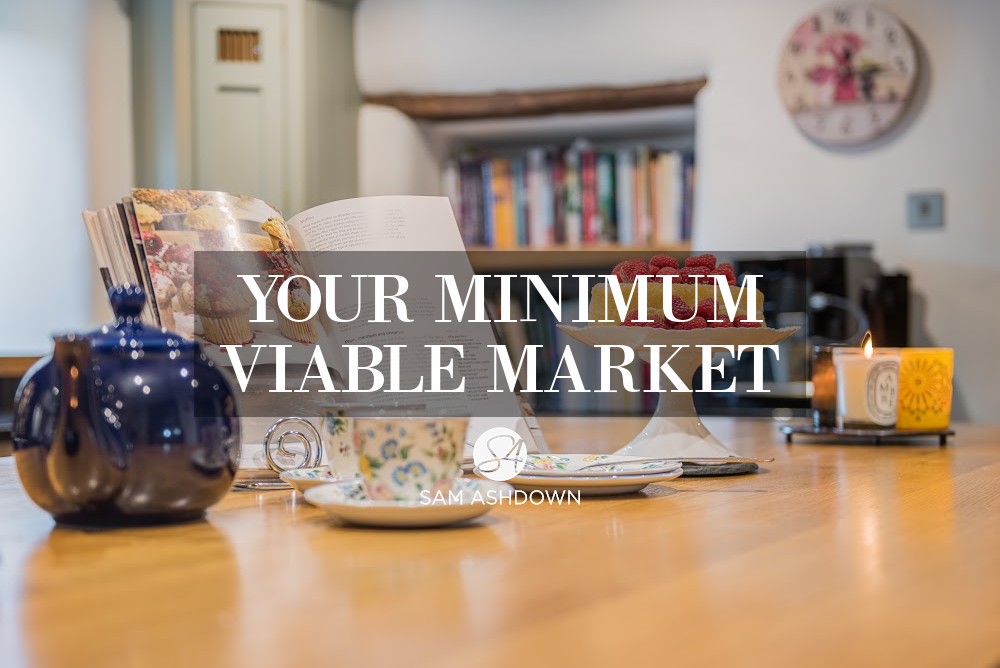We are all marketed to, all of the time. Most marketing is noisy, shouty and intrusive. It interrupts our reading, watching and browsing. And most of it is entirely irrelevant to us.
The only time I notice an advert, is when it speaks to me directly. When I’m fast-forwarding the ads on tv (no one watches tv live any more, after all), and I see one that has some meaning for me, I stop, rewind and watch it. It could be the latest John Lewis ad, that entertains me. Or a trailer for the new series of my favourite tv programme. If it’s for me, it gets my attention. Otherwise, I skip it. All those wasted ad pounds, unseen and ignored.
Marketing used to be buying attention cheap. Now attention is no longer cheap. Attention is very expensive and hard-won.
You cannot win attention by telling your audience about you. They don’t want to know about you. They want to read or watch something that will benefit them in some way. And they want to engage with a person or brand that has earned the right to their attention, and not squandered that right.
Your content – which is any touchpoint with your audience – needs to clearly communicate these six elements:
1. We understand
2. We care
3. We are like you
4. We like you
5. We can help you
6. You need us
You can’t skip a step. You can’t tell them they need you if you haven’t put the foundations in to build the trust in the relationship. They have to believe that you do genuinely understand and care, and feel that you are on the same wavelength as they are. And they have to know what you stand for – your ‘why’. Otherwise the connection is broken and they will not engage with your content.
The simplest way to gain your audience’s trust and attention, is by showing them what you do, that no one else does. Imagine you can only serve 50 clients this year. Who would you choose? What would you want them to know about you? Why should they care? This is what Seth Godin calls the ‘Smallest viable audience’. How can you serve a small number of people so well that they become fans for life? By being known for something so specific, it makes your competition and your fee irrelevant.
What can you be known for?
We’re known for unique homes. Not necessarily highly priced, but these two things do tend to go together.
Imagine you want to become a photographer. Would you choose to be a generalist, or a specialist? Would you prefer to do a few weddings, some estate agency photography and perhaps the occasional newborn baby photoshoot? Or would you pick one niche and do whatever you can to become an expert in that niche?
Try to be all things to all people, and you’ll wind up being nothing to nobody. You’ve heard of the saying, “Jack of all trades; master of none”? A specialist gives you the peace of mind a generalist can’t. We assume they know things the generalist doesn’t; they can do things the generalist can’t.
What are you a specialist in?
Let’s say you’re going to be a newborn baby photographer. You’ll need props, the right lighting, the correct lenses, specialist equipment, (fan heater, hot water bottle, moses basket) and stock (albums, frames, etc.). Most importantly, you’ll also need the right network and connections – baby groups, mums, and so on.
Now imagine trying to establish yourself as a photographer in all the niches above? Granted, one newborn baby photoshoot may lead onto a wedding, and vice versa, but if that happens, you can decide whether to accept the booking or to refer it onto a specialist, when it happens.
There’s a photography company in the UK called ‘We Shoot Bottles’. Guess what they specialise in? Here’s what they say on their website:
“We are based in the UK and we shoot bottles, lots of bottles! Our speciality is photographing bottles of any shape, any content, any size, at a price that makes everyone happy.”
If you owned a company that sold stuff in bottles and you needed a photographer for some marketing images, who would you call? Joe Bloggs Photography down the road who does a bit of everything? Or ‘We Shoot Bottles’ where you could be forgiven for assuming you were going to get the very best specialist bottle photographer?
I know which I’d choose.
When you niche, you’re signalling that you’re an expert. You’re displaying confidence in your chosen area of knowledge and skill. And you’ll attract those people who want a specialist to sell their particular type of home.
I have a client who is based down on the south coast in a large seaside town. There are lots of beach huts in her town. And she sells more beach huts than all of her competitors put together. Why? Because she’s known as the expert in beach hut sales. When the council wanted to put together a working party to discuss the policies surrounding beach hut sales, they called in my client to give them her input and advice. As an expert. No other estate agent was asked to give their opinion.
If you lived in her town and you wanted to buy or sell a beach hut, wouldn’t you want her on your side?
When you say you take on properties from an £80,000 flat to a £500,000 barn conversion, you lose your credibility. If I wanted to sell a £1 million home in your area, which agent would I go to? For every £80,000 flat you take on, you risk losing the £1 million plus property. The owners are just not going to have faith that you can sell a home of the calibre of theirs. And maybe you can’t.
If you’re accustomed to selling little flats and terrace houses, you probably take your own photos, write your own property descriptions, create your own floor plan and let your CRM produce an ‘online brochure’ on demand. Your £1 million guys are going to be looking for a better service than that, sorry.
What you produce for the bottom of the market just won’t cut if for the top properties.
If you’ve never created bespoke marketing before, what are you going to show them to prove you can sell their home effectively with the marketing it deserves?
Why should they take a punt on you and agree to be your guinea pig?
On the other hand, you could specialise in just one type of property, like my friend Peter Greatorex, at The Apartment Company in Bath. He only sells apartments; no exceptions. He’s very, very good at it. So he can command a premium fee for his services. Anyone in Bath who owns a beautiful period apartment will almost certainly at least invite Peter out for a valuation.
He currently has 15% of all the apartments over £200k on his books in Bath, despite the fact that there are 48 estate agents there. That’s because Peter knows all the best apartments in the City, intimately. He knows exactly how much they are likely to sell for, he’s met many of the owners, is familiar with any inherent problems with the building, lease or management company, and he knows just how to market each one to get the best possible result for his clients. Because he’s an apartment specialist.
But how do you choose which type of home to specialise in?
One way of deciding which part of the market you’d like to be known for is, to think about the type of client you prefer to work with. For example, do you enjoy helping first time sellers, or do you feel you have more in common with upsizing families? Perhaps you’re already really good at helping homeowners to downsize, or maybe selling landlord investment properties is more your thing.
Whoever you feel the most affinity with is probably your best target market.
BUT – you need to make sure your choice is a financially sound one. For example, if you choose to work predominantly with first time sellers, and in your area that means properties around the £150,000 – £200,000 price point, you may find you’re going to come head-to-head with Purple Bricks and the other onlines.
What are you going to do to prove differentiation and the worth of your fee?
Or are you simply going to charge what they do, and compete on fee? At just £899 including VAT per sale you’ll need to sell an awful lot of smaller properties to turn a profit. And given that the lower end of the market also tends to generate a higher number of viewings, you could find yourself doing a lot of work for very little financial reward.
At our end of the market, we still face challenges of course. Properties around the £1 million mark in our area statistically take a year and a half to sell. When you’re selling a second home at that level – for that’s what the majority of them are in our area – you’re just not in a hurry to sell, and nor is your buyer in any great rush to buy. Some of our buyers have browsed for years before they actually commit. And all that time, we’re funding the marketing.
And then there’s the question of the marketing spend. We routinely spend over £800 on a marketing package that includes lifestyle photography, drone and twilight imagery, pro-copywriting, bespoke visual branding and a 12-16 page high quality brochure. That level of marketing just doesn’t come cheap. That said, we take the smooth with the rough – the smooth being that our average fee is well in excess of £10,000. We work very hard for our clients but we are also well recompensed.
When you imagine the kind of typical Starbucks customer, what image do you have in your head? Starbucks conducted some customer research a few years back and as a result, came up with a composite customer, called ‘Gareth’. Gareth is around 30 years old, wears jeans and Converse, works as something creative, is self-employed and carries a MacBook Pro. You’ll find him using the free wifi and enjoying a vente latte with an extra shot, and a blueberry muffin on the side.
Have you ever seen him in a Starbucks?
Perhaps not, but I bet you can picture Gareth pretty clearly.
Now try to do that for a Waitrose customer; an X-Factor watcher, a Guardian reader; a Brietling wearer.
Chances are, your brain came up with its own interpretation of what these people look like (which may have no basis in fact). The ability of your brain to do this is known as a heuristic – a kind of cranial short cut. Heuristics help prevent your brain from becoming overwhelmed and overloaded with too much information, creating stereotypes to save space on your brain’s hard drive.
Now try doing the same for your ‘typical’ client. No such thing? Do you find this impossible to do?
Perhaps it’s because you don’t really know who your ideal client is well enough to characterise them.
Let me tell you about our typical client.
Tom and Claire live in the South Lakes (we’re in Windermere). Tom drives and Audi, Claire a Range Rover. They have two children: Harry is late primary age, Tilly is early secondary. They’re both in our local private school as day children.
Tom runs his family’s hotel, and Claire is a wedding photographer. They have a busy social network, and are well-liked and respected in the community. Even though they are relatively financially secure and well-educated, they’re remarkably down-to-earth and don’t take themselves too seriously.
They enjoy their brands: Audi, Land Rover, The White Company, Apple, Booths (Cumbria’s answer to Waitrose) – but not for their own sakes, or to show off. They like these brands because of the value exchange they offer. As both Tom and Claire are entrepreneurial in nature and practice, they buy local whenever they can, and when it makes sense to do so. They are also drawn to other entrepreneurs, and enjoy networking and social events where they can widen their friendship circle.
These are all the reasons they love our brand: AshdownJones. They are attracted to our ‘why not’ philosophy and attention to detail ethos. They love our highly personal and attentive level of service, coupled with our delivery of our specialist marketing experience. They don’t want middle-of-the-road in anything, especially not in their estate agent. So they are unlikely to be drawn to Savills or Fine and Country. Our brand is perfect for them. It’s stand-out, bold and confidently different – just like they are.
When people talk about you and your brand, what do they say? What does your brand stand for? If someone was referring you and you could be a fly on the wall while they explained why you were their agent of choice, what would you hear them say? “Use XYZ Agents because they _________” – what?
If you stand for something, you make it easy for others to refer you.
When you stand for something, your content strategy becomes easier. Because it’s guided by your perfect client and your specialist way of serving them. Your minimum viable market will become the most valuable asset in your agency, because only you will understand deeply what your audience truly needs and wants.
I know you might find the idea of appealing so strongly to one specific market a risk, but the opposite is true. Without niching, you’re forgettable and probably irrelevant.
If you want to be memorable and relevant, and for your audience to actually care enough to read your content, follow your social media and want to talk to you, then stand for something your minimum viable market really wants.
Would you like me to email amazing tips and tactics to help you grow your agency, every week?
If you don’t already get my Supertips emails, you’re missing out! These little nuggets of wisdom could transform your agency, and your fortunes. Just click here and I’ll make sure you get yours, every week.
Book a call book for a chat with my team to find out more about how we work, just tell us a bit about your business using this link, and let’s talk.
Sam



